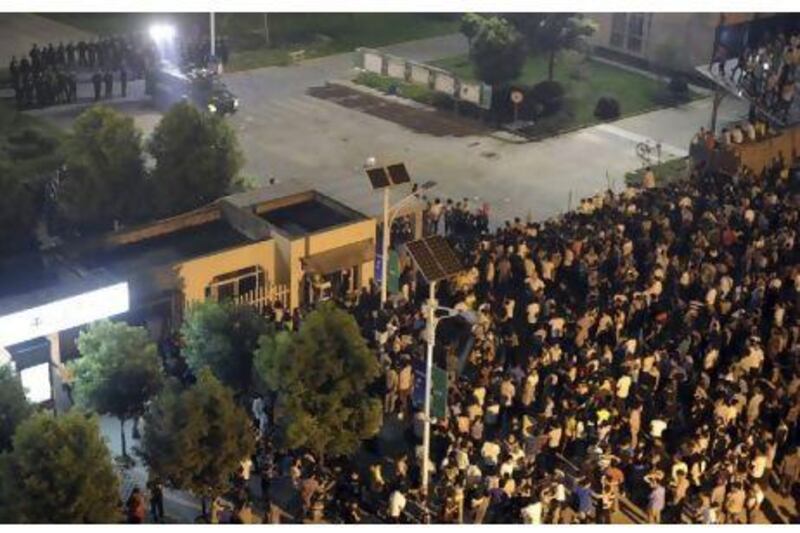BEIJING // Operations at a solar-power panel factory that was polluting the environment have been halted, after protests by hundreds of Chinese concerned about the side-effects of the country's rapid economic growth.
Demonstrations that began on Thursday at the Zhejiang Jinko Solar Company plant in Haining city, near Shanghai, turned violent, with locals storming the factory, wrecking offices and turning over vehicles.
Yesterday, it appeared as though the demonstrations had achieved their goal: authorities called a halt to the plant's operations and ordered it to overhaul its discharge processes after it was found to be releasing excessive amounts of fluoride.
The protests, which attracted more than 500 people, mirrored events last month in Dalian in north-east China, where 12,000 people protested over a chemical plant they claimed was releasing toxins into the environment, before local officials said the facility would be closed.
China's near double-digit economic growth has increased prosperity at the cost of large-scale environmental damage, including air pollution that is believed to cause more than 1,000 deaths a day, according to a World Bank report.
The country's waterways and soil also have suffered heavily from discharges from factories, with authorities often accused of lax enforcement of environmental standards as they try to meet growth targets.
People are less willing than before to accept environmental damage as the price of wealth, according to Wang Xiaojun, a spokesman for Greenpeace China.
"At the beginning, people were excited at how fast China was developing and how much money people were making," he said.
"But now, with more education and more exposure to different cultures, more people have higher requirements for their quality of life.
"It's no longer just about money. It's how long you can live, how healthy your kids are and how safe your food is."
The protests in Haining were sparked by concerns that fish in nearby rivers had died because of pollution from the factory. Officials said the plant had failed to adhere to standards for discharges for several months.
"Since they set up their operations here, there has definitely been an impact on the villagers here. We do not know how our health will be in the future. This pollution is definitely harmful to us," Ren Suifen, 55, told Reuters.
A company spokesman yesterday told reporters the firm "sincerely apologises" for releasing pollutants and would clean up the affected area.
Ironically, given the environmental problems at the plant, solar power is playing an increasingly important role in China's efforts to reach renewable energy targets. The government wants there to be 10 gigawatts of installed solar power generating capacity in 2015, up from 0.7 gigawatts now.
The latest victory by protesters, coming just weeks after the order to close the chemical plant in Dalian, could be seen as evidence of the growing power of the people in a country with an authoritarian, top-down political system.
However, protests about environmental issues were more tolerated in China than those concerning many other causes, said Joseph Cheng, a political analyst at the City University of Hong Kong.
"This is because the central government is interested in conservation of the environment and the protesters tend to blame the local [rather than national] officials," he said.
"The central government does not see this as a challenge to the regime ... so they're tolerated and so the people are much bolder on these issues."
The authorities' attitude to protests calling for democratic reforms, such as the attempts earlier this year to hold gatherings inspired by the upheavals in the Middle East, is very different.
"They certainly will be suppressed immediately," Mr Cheng said.
Even in the Haining protests, there have been signs that the authorities' tolerance went only so far. One local person was arrested after being accused of spreading rumours online about cancer cases among local people. Also, a television crew covering the protests had their equipment damaged by company workers.
Commentators have said that although Communist Party authorities respond to criticism on occasion, they often ignore environmental issues when formulating development plans.
With respect to the environment, Greenpeace's Mr Wang said more anti-pollution measures were being introduced, yet the vast scale of the problem and of the country meant progress was slow. Ensuring local authorities adhered to the central government's directives was also difficult, he said.
"It's not enough for the central government to be aware of it," he said.






